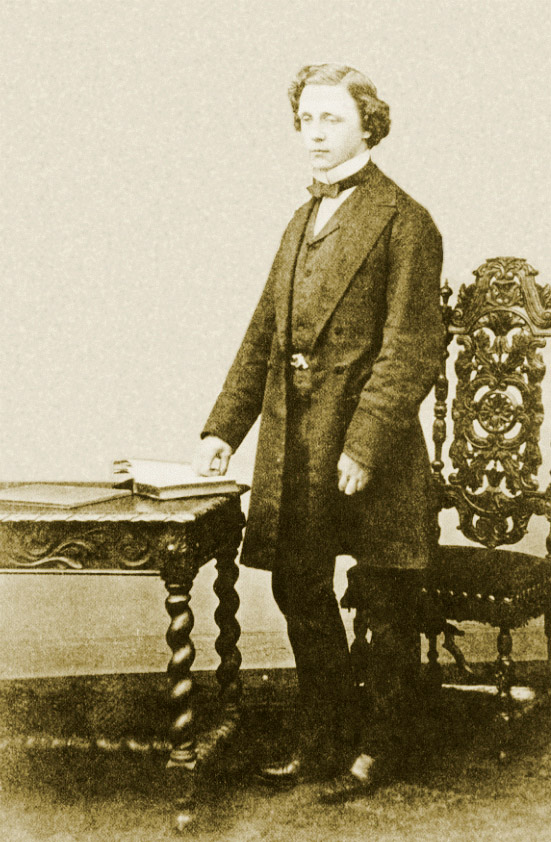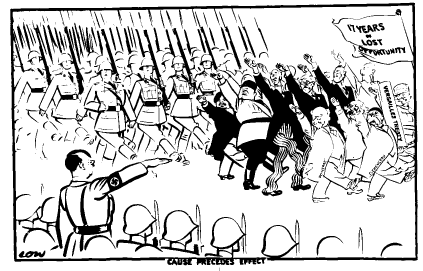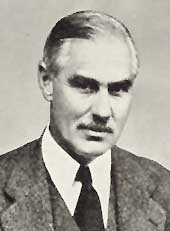January 27 British anxieties were inflamed further by Wilhelm's tactless posturing. Bülow was replaced by Theobald von Bethmann Hollweg, who tried to come to an agreement with Britain. He failed when Britain refused to promise neutrality in any Franco-German war unless Germany agreed to limit its fleet, which was unacceptable to the Germans. Responsible for government appointments and commander in chief of the armed forces, Wilhelm was the only person in Germany who could ensure that military and diplomatic policies were in tune. During and immediately after the war he was vilified in Britain for causing the war. However, his real failure was to encourage Germany's leaders instead of restraining them at a time when German expansion made some form of conflict with the established great powers seem inevitable..."
1822 Greece proclaims its independence from Turkey.

1832 Birth: Lewis Carroll (Charles Dodgson), mathematician, author.
1850 Birth: Samuel Gompers, US labor union leader, 1st president of the AFL (American Federation of Labor).

1851 Death: John James Audobon, wildlife artist, at 62.

1859 Birth: Kaiser Wilhelm II, the Third German Emperor and grandson of Queen Victoria. "...German emperor (Kaiser) and king of Prussia from 1888 to the end of World War One in 1918, known for his militaristic manner as well as for his indecisive policies. Wilhelm was the eldest child of Crown Prince Frederick (later Emperor Frederick III) and Victoria. In 1888 Wilhelm's grandfather died. Crown Prince Frederick died shortly afterwards and, aged just 29, Wilhelm became Kaiser. Within two years he had forced the resignation of Chancellor Bismarck and later appointed von Bülow to the position. Wilhelm wanted von Bülow to persuade the Reichstag to accept whatever policies the Kaiser and the upper classes wanted, usually completely unsuitable for the rapidly industrialising Germany. Bülow's foreign policy included the German Naval Bills of 1897 and 1900, which threatened British naval domination.


1877 Birth: Dr. Hjalmar Schacht, financial wizard of the Third Reich; President of the Reichsbank until 1939 and Minister without Portfolio until January 1943. Schacht will be acquitted at Nuremberg in 1946 despite protests by the Soviet judge. "...The task of mobilizing the German economy for aggressive war began promptly after the Nazi conspirators' seizure of power. It was entrusted principally to Schacht, Goering, and Funk. Schacht was appointed President of the Reichsbank in March 1933, and Minister of Economics in August 1934. The world did not know, however, that the responsibility for the execution of this program was entrusted to the office for the Four Year Plan under Goering. Nor did the world know that Schacht was designated Plenipotentiary for the War Economy on 21 May 1935, with complete control over the German civilian economy for war production in the Reich Defense Council, established by a top secret Hitler decree ... Through Schacht's financial genius monetary measures were devised to restore German industry to full production; and through the control of imports and exports, which he devised under his new plan of 1934, German production was channeled in accordance with the requirements of the German war machine..."

1883 Birth: Gottfried Feder, leading ideologist and cofounder of the DAP. "...the son of a government official...He studied engineering in Berlin and Zurich before starting his own construction company in 1908. During the First World War Feder developed a hostility to Germany's wealthy bankers and in 1919 he published his Manifesto on Breaking the Shackles of Interest. He joined with Dietrich Eckart to form the German Workers's Party (GPW) in Munich. Adolf Hitler joined the party soon afterwards. He was only the fifty-fourth person to join the party. Hitler was immediately asked to join the executive committee and was later appointed the party's propaganda manager....In February 1920, Feder joined with Hitler and Drexler to draft what became known as the "25 Points." In the program the party refused to accept the terms of the Versailles Treaty and called for the reunification of all German people. To reinforce their ideas on nationalism, equal rights were only to be given to German citizens. "Foreigners" and "aliens" would be denied these rights. To appeal to the working class and socialists, the program included several measures that would redistribute income and war profits, profit-sharing in large industries, nationalization of trusts, increases in old-age pensions and free education. The program also reflected the racist views shared by party members. It appealed to the Anti-Semitism that existed in Germany at that time by stating that "Citizenship is to be determined by race; no Jew to be a German." Feder greatly influenced the anti-capitalist aspect of the Nazi program and insisted on phrases such as the need to "break the interest slavery of international capitalism" and the claim that Germany had become the "slave of the international stock market..."

1888 The National Geographic Society is founded in Washington, DC.

1897 Birth: Karl Oberg, Supreme Head of the SS and Police in occupied France from 1942 to 1945. Will be arrested by American military police in June 1945, and sentenced to death by courts in both Germany and France before being pardoned by French President Charles de Gaulle in 1965.

1900 Birth: Hyman Rickover, US Navy Admiral, Father of the Nuclear Navy. "Vice Admiral Hyman George Rickover took the Navy into the atomic age with his persistence that the U.S. Navy build the first atomic-powered submarine. He was born in Russian Poland in 1900 to Rachel, nee Unger, and Abraham Rickover, a tailor who brought his family to Chicago. After completing high school in 1918, Rickover received an appointment to the United States Naval Academy, where he was often confronted with anti-Semitism. He graduated in 1922 and was commissioned an ensign. Assigned to sea duty, he remained there for five years before being assigned to the Naval Academy to do graduate work in electrical engineering. He continued his studies at Columbia University where he received his M.S. degree in 1929. Rickover's various assignments included his first command post aboard the U.S.S. FINCH in the Philippines. When World War II started., he was placed in charge of the electrical section of the Bureau of Ships in Washington, D.C. in the first of many wartime appointments. In 1946, he was assigned to Oak Ridge, the site of the development of the atomic bomb. Rickover visited other nuclear research centers and he became convinced ships could be powered by nuclear energy. Almost alone in his belief, he finally convinced the Navy to begin to develop a nuclear submarine in 1947. Before long he was placed in charge of the project and worked with the Atomic Energy Commission, which was going to build the reactors. The reactors were built in Idaho; the submarine in Groton, Connecticut. Finally, in January 1954, the first atomic-powered submarine, the NAUTILUS, was launched. Despite his success, Rickover faced opposition both toward his work and toward his open criticism and remarks. After he had been twice passed over for promotion to admiral (the naval codes require retirement if promotion is twice denied), congressional leaders suspected that he was a victim of "foul play." Following an investigation, he was named a rear admiral in 1953. His many plans for nuclear ships were put aside during the Congressional hearings. He is often credited with being President Jimmy Carter's mentor, but was a critic of President Reagan's defense budget, which he considered to be wasteful and too large. In 1982, he was forced into retirement at age 82. When Rickover retired, he expressed regrets on the role he played in nuclear proliferation and called for an international agreement to outlaw nuclear weapons and reactors because of the radiation dangers that they pose."
1916 WW1: The Spartacus League, forerunner of the German Communist Party, is formed in Berlin.
1923 Weimar: Jan 27-29 The NSDAP holds its first ever Party Rally in Munich. (Maser)
1926 The earliest public demonstration of a form of television is given by John Logie Baird of Scotland, using a development of the mechanical scanning system suggested by Paul Nipkov in 1884.
1931 Birth: Mordecai Richler, author.

1932 Weimar: Hitler gives an important speech in Dusseldorf, at the Industry Club. "There are…two other closely related factors which we can time and again trace in periods of national decline. The one is that for the conception of the value of personality there is substituted a leveling idea of the supremacy of mere numbers: Democracy. And the other is the negation of the value of a people, the denial of any difference in the inborn capacity, the achievement, etc., of individuals. Thus both factors condition one another, or at least influence each other in the course of their development. Internationalism and democracy are are inseparable conceptions..."

1938 Ribbentrop repeats Germany's Danzig proposals in Warsaw.

1941 WW2: Joseph C. Grew, American Ambassador to Tokyo, informs the US State Department that "The Peruvian minister has informed a member of my staff that he had heard from many sources, including a Japanese source, that, in the event of trouble breaking out between the United States and Japan, the Japanese intended to make a surprise attack against Pearl Harbor..." (Theobold)

1941 WW2: Ezra Pound, an admirer of Mussolini, begins recording talks for broadcast over Rome Radio. He will make more than 300 broadcasts for the Fascists.

1941 WW2: Hitler advises Antonescu to "liquidate" the Romanian Legionary Movement and German forces are soon ordered to help crush the Legionaries.
1942 Church and Reich: Rosenberg, with Bormann's concurrence, issues an order forbidding any further discussion of religious questions in the Party's work of ideological indoctrination. (Bundesarchiv, Koblenz; Lewy)

1943 WW2: The US Eighth Air Force makes the first all-American bombing raid on Germany with a daylight raid on Wilhelmshaven.
1944 WW2: The Soviet Army relieves Leningrad after the German siege which has lasted 890 days. Since September 1941 the people of Leningrad had withstood German artillery and air bombardment. More than 200,000 of them had been killed in the siege; half a million more die from cold, starvation, fatigue and exhaustion.

1944 Birth: Mairead Corrigan, pacifist, Nobel Peace Prize winner.

1945 Holocaust: Advancing Soviet troops enter Auschwitz-Birkenau. They find the bodies of 468 dead inmates: Jews, Poles and Gypsies. (Atlas) Note: Only about 2,800 people remain alive at Auschwitz. Abandoned by the SS, they had been left behind without food, water, or heat. In storehouses that the SS neglected to destroy, the Soviets discover 836,255 women's coats and dresses, 368,820 men's suits, and seven tons of human hair. (Apparatus)
1945 WW2: The Lithuanian port of Memel falls to the Soviets.
1945 WW2: Patton's Third Army crosses the Our River and captures Oberhausen.

1945 Holocaust: Oscar Schlindler, a German Catholic and member of the Nazi Party, who owns a number of factories in the area, saves 85 Jews from a train at Brünnlitz. They had been locked in their cattle-cars for a week, and more than 20 had already died. Schindler releases the Jews and gives them food and shelter at the risk of his own life. (Atlas)
1948 Wire Recording Corporation of America announces the first magnetic tape recorder. The ‘Wireway’ machine with a built-in oscillator sells for $149.50.
1952 After serious rioting in Cairo the previous day, Egyptian Prime Minister Nahhas Pasha is dismissed and replaced with Aly maher Pasha.
1962 The Soviet government changes the names of all places honoring Molotov, Kaganovich and Malenkov, participants in an attempt to oust Nikita Khrushchev in 1957.
1964 France establishes diplomatic relations with the People's Republic of China.
1967 The British Queen knights Francis Chichester with a sword which belonged to Sir Francis Drake.
1967 60 nations sign a UN treaty on the peaceful uses of outer space and the banning of weapons of mass destruction there.

1967 Tragedy strikes on the launch pad of Apollo 204, scheduled to be the first Apollo manned mission. A flash fire in the command module during a preflight test, kills astronauts Virgil Grissom, Edward White and Roger Chaffee. After the disaster, the mission is officially designated Apollo 1.
1969 14 men, nine of them Jews, are executed in Baghdad for spying for Israel.
1973 The Nam: A cease-fire agreement is signed in Paris between the US and Vietnam.
1994 The Mexican government and eight political parties signs an agreement calling for electoral change in a bid to end a peasant uprising in the southern state of Chiapas.
1996 The military seizes power in Niger, ousting the country's first elected president.
2001

2001

2002

2002

2003

2003

2004

2004

2005

2005

2005

2005

2005

2005

Visit:




 Visit:
Visit:

Click Here to email the History: One Day At a Time webmaster.